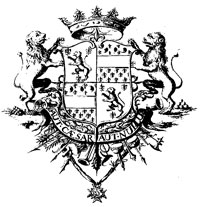Wall's
'Discreet Spain'
|

Ricardo Wall's
coat
of
arms
(Parish
records,
Fuentevaqueros,
Granada) |
From research
into Wall's ministry it is possible to distinguish several
contributions to the general debate on the Spanish Eighteenth
Century. One of them is to answer some questions such as where
and how political power was exerted during Wall's ministry and
by whom. The Royal Court is the main scene, a place where
politicians, courtesans, artists, intellectuals, high-ranking
soldiers and clerics were centre-stage. Their purpose was to
influence the 'Royal Desire'. The Secretaries of State became
key players in the system because of their control over some
information channels. They dispatched messages to the
sovereign about political concerns, so that they could
monopolise the King's influence. For that reason they were
regarded as new 'court favourites' or 'ministerial despots' by
political rivals. The courtesan intrigues consolidated
themselves as a new form of social protest.
In this sense,
the biography of the Irish minister confirms the validity of
'absolutism/enlightened despotism' as a historiographic
category. Absolutism as a political system was disguised with
elements of the Enlightenment. Wall is a perfect example of
this. Nevertheless, his motivations were those of the State.
Wall was capable, as a politician, of taking recalcitrant
measures (Burriel and the Commission of Archives, for
example), but he was also able to sponsor people such as D.
Francisco Manuel de Mena and José Clavijo y Fajardo, very
well-known intellectuals. This does not prevent the existence
of a significant qualitative change with respect to previous
times, which can be recognised and which justifies the
invention of a new historiographic category.
Thanks to
Wall's professional experience and versatility, I have been
able to study the functions of several Spanish institutions in
the eighteenth century: the army, the diplomatic service and
the secretaries. For instance, the army is revealed as a far
more complex institution, which sometimes serves as an
instrument of social integration of foreigners or as a
mechanism of social permeability. The same is true of
diplomacy, where more important changes throughout the
eighteenth century came from Wall's reforms (changes in the
social extraction and in the geographic origin of ambassadors,
the establishment of a diplomatic cursus honorum and
new embassies in Russia, the Turkish Empire and Saxony).
Other
reflections arise, very much linked to this institutional
sphere. On the one hand, the role of the Irishmen and of other
foreigners in Spanish society during the Modern Age in
general, and in the eighteenth century in particular, is
highlighted. On the other hand, the interrelation that exists
already at so early a time between the diverse European
chancelleries, a sort of initial political globalisation.
There are some international political networks between
politicians from different countries whose interests were the
same. The Duke of Newcastle or Tanucci were the most important
international allies of the Irish minister. These links
explain the profound consequences that political movements had
all over Europe. There are several examples, the main one
being the repercussion of Ensenada's fall, a very important
factor that contributed to the Reversion of Alliances.
These ideas
contribute to modifying our vision of Spain in the eighteenth
century. The country had great vitality and was in expansion,
because the political elite became conscious of the necessity
to change the image of a hegemonic Imperial Spain on the
international stage to a 'Discreet Spain' that concentrated
its efforts on internal recovery. Colonial administration was
also improved in order to recover influence on international
relationships. These efforts would be mitigated at the end of
the century with the arrival of the French Revolution.
Diego Téllez
Alarcia
|

Wall's baptismal record
(Archives Départementales de la Loire-Atlantique,
Registres paroissiaux, Nantes, Église de Saint Nicolas,
BMS, 1691-1697) |
|



